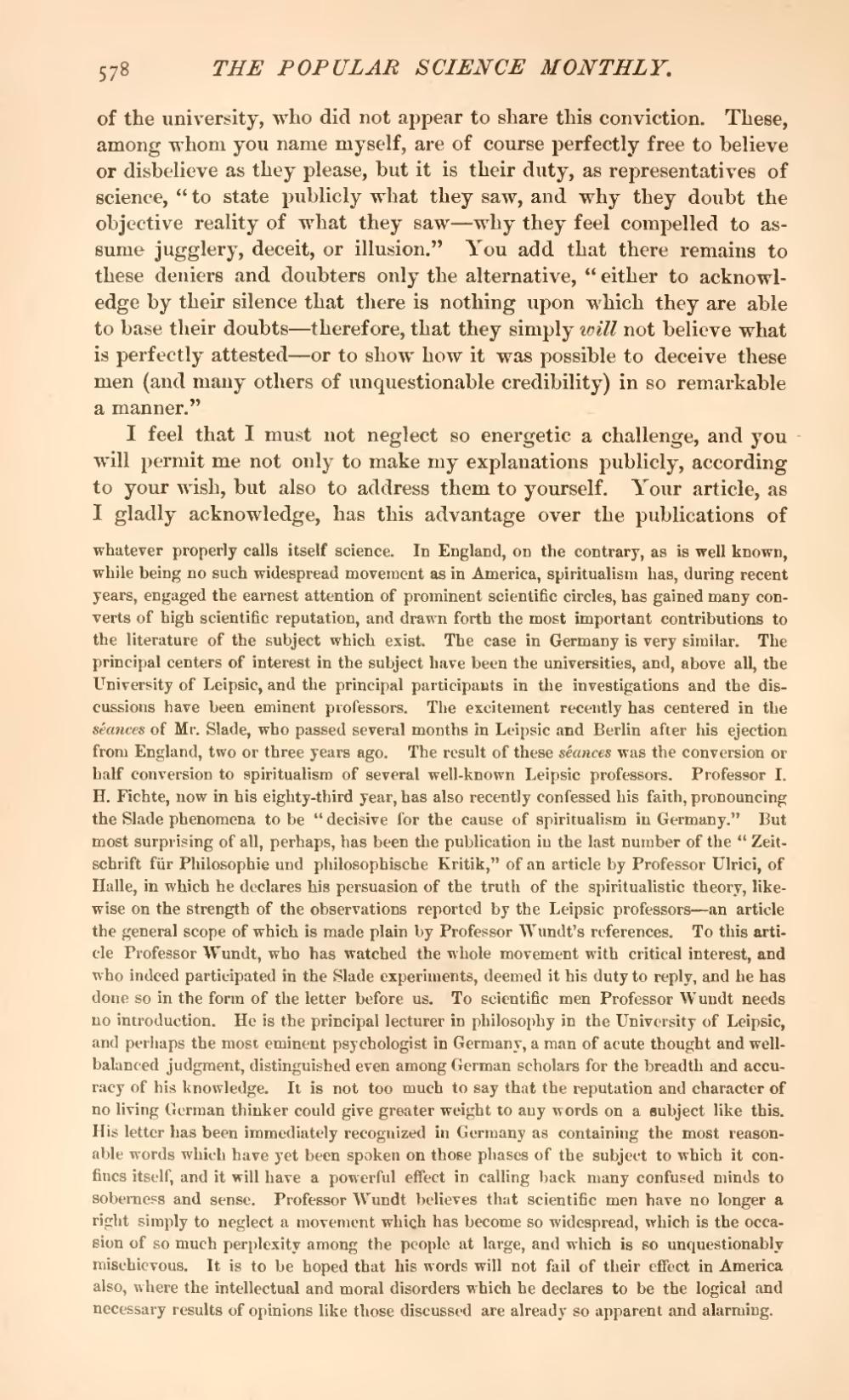of the university, who did not appear to share this conviction. These, among whom you name myself, are of course perfectly free to believe or disbelieve as they please, but it is their duty, as representatives of science, "to state publicly what they saw, and why they doubt the objective reality of what they saw—why they feel compelled to assume jugglery, deceit, or illusion." You add that there remains to these deniers and doubters only the alternative, "either to acknowledge by their silence that there is nothing upon which they are able to base their doubts—therefore, that they simply will not believe what is perfectly attested—or to show how it was possible to deceive these men (and many others of unquestionable credibility) in so remarkable a manner."
I feel that I must not neglect so energetic a challenge, and you will permit me not only to make my explanations publicly, according to your wish, but also to address them to yourself. Your article, as I gladly acknowledge, has this advantage over the publications of
whatever properly calls itself science. In England, on the contrary, as is well known, while being no such widespread movement as in America, spiritualism has, during recent years, engaged the earnest attention of prominent scientific circles, has gained many converts of high scientific reputation, and drawn forth the most important contributions to the literature of the subject which exist. The case in Germany is very similar. The principal centers of interest in the subject have been the universities, and, above all, the University of Leipsic, and the principal participants in the investigations and the discussions have been eminent professors. The excitement recently has centered in the séances of Mr. Slade, who passed several months in Leipsic and Berlin after his ejection from England, two or three years ago. The result of these séances was the conversion or half conversion to spiritualism of several well-known Leipsic professors. Professor I. H. Fichte, now in his eighty-third year, has also recently confessed his faith, pronouncing the Slade phenomena to be "decisive for the cause of spiritualism in Germany." But most surprising of all, perhaps, has been the publication in the last number of the "Zeitschrift fur Philosophie und philosophische Kritik," of an article by Professor Ulrici, of Halle, in which he declares his persuasion of the truth of the spiritualistic theory, likewise on the strength of the observations reported by the Leipsic professors—an article the general scope of which is made plain by Professor Wundt's references. To this article Professor Wundt, who has watched the whole movement with critical interest, and who indeed participated in the Slade experiments, deemed it his duty to reply, and he has done so in the form of the letter before us. To scientific men Professor Wundt needs no introduction. He is the principal lecturer in philosophy in the University of Leipsic, and perhaps the most eminent psychologist in Germany, a man of acute thought and well-balanced judgment, distinguished even among German scholars for the breadth and accuracy of his knowledge. It is not too much to say that the reputation and character of no living German thinker could give greater weight to any words on a subject like this. His letter has been immediately recognized in Germany as containing the most reasonable words which have yet been spoken on those phases of the subject to which it confines itself, and it will have a powerful effect in calling back many confused minds to soberness and sense. Professor Wundt believes that scientific men have no longer a right simply to neglect a movement which has become so widespread, which is the occasion of so much perplexity among the people at large, and which is so unquestionably mischievous. It is to be hoped that his words will not fail of their effect in America also, where the intellectual and moral disorders which he declares to be the logical and necessary results of opinions like those discussed are already so apparent and alarming.

